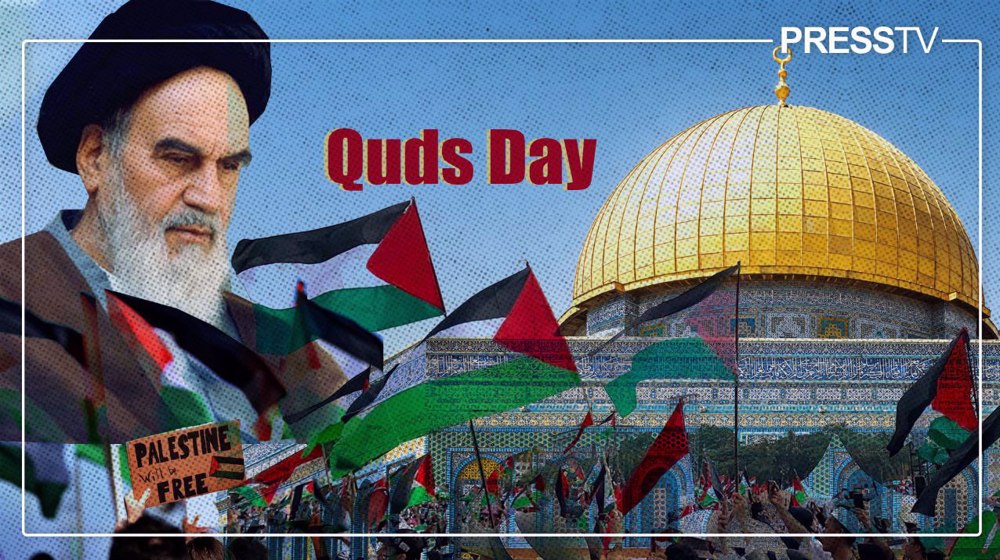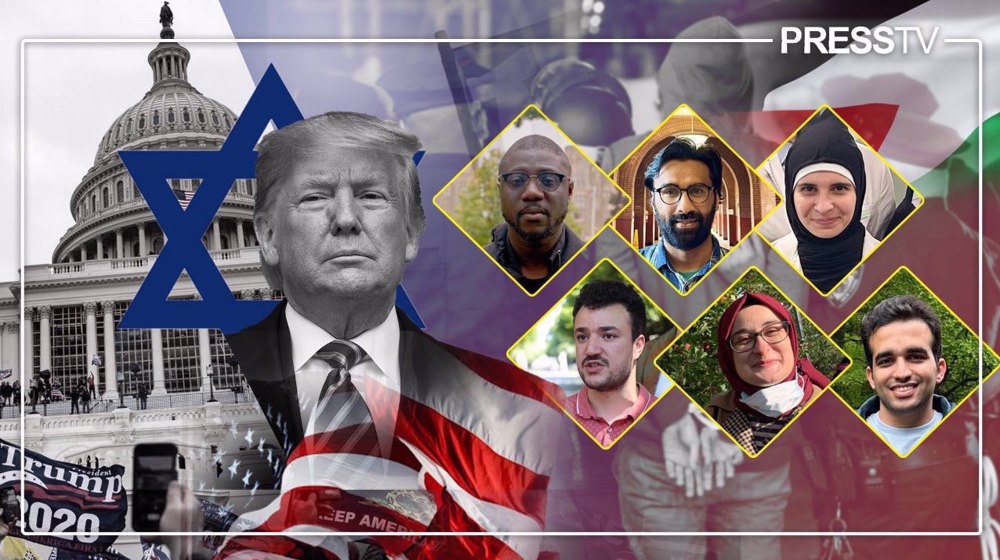'Land of the unfree': Trump admin’s war on pro-Palestine activism on US campuses
By Roya Pour Bagher
Momodou Taal, a British-Gambian activist and former PhD student at Cornell University, announced on Tuesday via a statement on his X handle that he is leaving the United States amid threats of deportation.
The pro-Palestinian student activist recently filed a lawsuit against the Donald Trump administration over its controversial executive orders targeting pro-Palestinian students at American universities, which also threatened him with deportation.
Momodou condemned the US government’s blatant disregard for the judiciary and the rule of law while criticizing those who remain silent about the ongoing genocide of Palestinians by the US-backed Israeli regime.
“For every person that has remained silent, just know that you are not safe either. Is the imprisonment of those who speak out against a genocide a reflection of your values? Is this the kind of nation you want to live in?” he wrote.
“The repression of Palestinian solidarity is now being used to wage a wholesale attack on any form of expression that challenges oppressive and exploitative relations in the US.”
Momodou is not an isolated case. The Trump administration recently revoked the visas of over 300 students due to their pro-Palestine activism in the so-called “Land of the Free,” where freedom of expression is an exclusive right for those who support the US military-industrial complex.
While American officials claim the move is tied to national security concerns—a long-standing euphemism for backing its Zionist proxy—it clearly exposes the selective approach to freedom of speech and activism in the United States.
Defending the policy, US Secretary of State Marco Rubio, known for his close ties to Zionist lobby groups such as AIPAC, stated, “We have a right, like every country in the world has a right, to remove you from our country.”
Iran will admit students expelled from US as part of Trump’s crackdown on pro-Palestine protestshttps://t.co/NE5Zop66S5
— Press TV 🔻 (@PressTV) March 30, 2025
Rubio also did not hesitate to call the brilliant minds studying at Ivy League universities “lunatics” simply because they oppose the ongoing genocide of Palestinians in Gaza.
As American Civil Liberties Union director Ben Wizner observed, “There’s something uniquely disturbing about sending a message to the best and the brightest around the world, who traditionally have flocked to US universities because of their openness, because of their freedom, because of their intellectual vigor, and now say, ‘We don’t want you here.’”
Indeed, every country has the authority to revoke visas for noncitizens, whether they are tourists, students, or long-term residents. However, how justified is this action?
Massive student protests and university encampments have erupted across the US in response to the government’s direct support and funding of Israel’s genocidal war on Gaza. Both American and foreign students at various institutions have raised their voices in outrage over American complicity in the ongoing massacre.
They have been the only sign of humanity and sanity in an otherwise inhumane and deafeningly silent Western world. These protesters deserved a standing ovation—but instead, that honor was given to the murderer presiding over the genocide of more than 50,000 Palestinians in Gaza since October 2023, most of them children and women.
Once again, American hypocrisy and double standards on human rights and freedom of speech are on full display.
Two years ago, the deadly riots in the Islamic Republic of Iran were not only backed by the US but orchestrated by it. That was fair game for American "regime change" acolytes, while legitimate student protests in the US are labeled “terrorism.”
Another fitting example is the Hong Kong protests of 2019-2020 over an extradition bill. The bill aimed to close a judicial loophole related to a murder case in Taiwan, but anti-China sentiment fueled widespread unrest, which saw active participation from both local and foreign nationals.
Unsurprisingly, the US enthusiastically supported the rioters, calling their actions a fight for democracy. Then-Secretary of State Mike Pompeo even urged the Chinese government to respect the rights of the protesters, describing the violence—persisting even after the Hong Kong Special Administrative Region (HKSAR) government withdrew the bill—as a cornerstone of democratic freedom.
Thus, when protests align with American interests, activism is celebrated and encouraged on the global stage—perhaps even deserving a new Grammy category.
The price we paid for freedom
— Press TV 🔻 (@PressTV) February 7, 2025
Under the Trump administration, pro-Palestine students face severe repercussions like suspension and deportation for expressing support. We spoke with two about their experiences.
Watch here: https://t.co/MN1oYL4uFW pic.twitter.com/EzlvAg6kwz
However, when similar demonstrations occur on American soil, particularly those challenging US foreign policy and its support for the child-murdering regime in Tel Aviv, they are suppressed without question.
Ironically, these pro-Palestine protests have been advocating for the enforcement of American laws, such as the Leahy Law, which the Trump administration has blatantly disregarded.
Examining the cases of individuals whose visas—and even green cards—have been revoked by the Trump administration further underscores blatant American hypocrisy.
One might assume those targeted were involved in damaging public property or harming civilians. However, that is far from the case.
Alireza Doroudi, an Iranian doctoral student at the University of Alabama, was arrested without explanation. His attorney stated, “We do not believe he is suspected to have committed any crimes nor participated in any political activities whatsoever.”
Rumeysa Ozturk, a Turkish graduate student at Tufts University, had her visa revoked for co-authoring an opinion piece on Gaza in the university newspaper.
While a Department of Homeland Security spokesperson claimed she engaged in activities supporting the Hamas resistance movement, there is no evidence to support this. Her article did not mention Hamas at all. She simply wrote about the ongoing genocide in Gaza and demanded that the school divest from the Israeli regime.
As a consequence, observers described—and footage confirmed—her detainment by federal agents as a kidnapping rather than an arrest.
Other cases include Indian PhD candidate Ranjani Srinivasan, who fled the US after agents appeared at her Columbia University housing without an arrest warrant. Badar Khan Suri, an Indian postdoctoral student at Georgetown University, was detained, though a federal judge blocked his deportation.
Legalities of Trump’s deportation of immigrants
— Press TV 🔻 (@PressTV) February 19, 2025
Rachel Hamdoun reports from New York. pic.twitter.com/QPjYM0phMW
Yunseo Chung, a Korean permanent resident—not a visa holder—is currently fighting deportation from the US. Dr. Rasha Alawieh, a Brown University professor, was deported from Boston to her home country Lebanon despite holding a valid visa.
Furthermore, reports indicate that AI is being used to “Catch and Revoke” visas, suggesting some students may have been flagged solely for liking pro-Palestine social media posts.
The targeting of foreign nationals highlights the US’ selective application of free speech. Not a single pro-Israeli regime protester or lobbyist has had their visa revoked, despite numerous documented instances of harassment and violence.
By targeting international students and threatening deportation, the US risks losing a global talent pool that has long been crucial to its academic and economic development.
Another consequence is that students worldwide no longer see the US as a desirable destination for higher education. Calls to boycott American universities are already growing.
These campus crackdowns are just another entry on the long list of American double standards. They also violate the First Amendment rights of noncitizens—a right the US claims to uphold.
It might not be long before Americans themselves are thrown out of their own country, as any federal action can be justified as long as there are “potentially serious adverse foreign policy consequences” for the US.
Roya Pour Bagher is a Tehran-based writer.
(The views expressed in this article do not necessarily reflect those of Press TV.)

The forgotten war: Sudan, crimes against humanity, and UAE’s deep complicity

Intl. Quds Day: None of us are free until Palestine is free – river to the sea

Intl. Quds Day is a global movement to end Israeli genocide and free Palestine
VIDEO | Trump’s tariffs risk global trade war; EU prepared to retaliate
VIDEO | Netanyahu visits Hungary despite arrest warrant
VIDEO | Madrid cultural event for Syria with documentary hailing fight against Takfiris
VIDEO | UK economy reels from impact of Trump Tariffs
UNRWA chief slams Israel’s attacks on UN facilities
VIDEO | The story of Heyam: nowhere is like Gaza!
Israeli warplanes carry out more airstrikes near Damascus
VIDEO | 'War Criminal' welcomed







 This makes it easy to access the Press TV website
This makes it easy to access the Press TV website